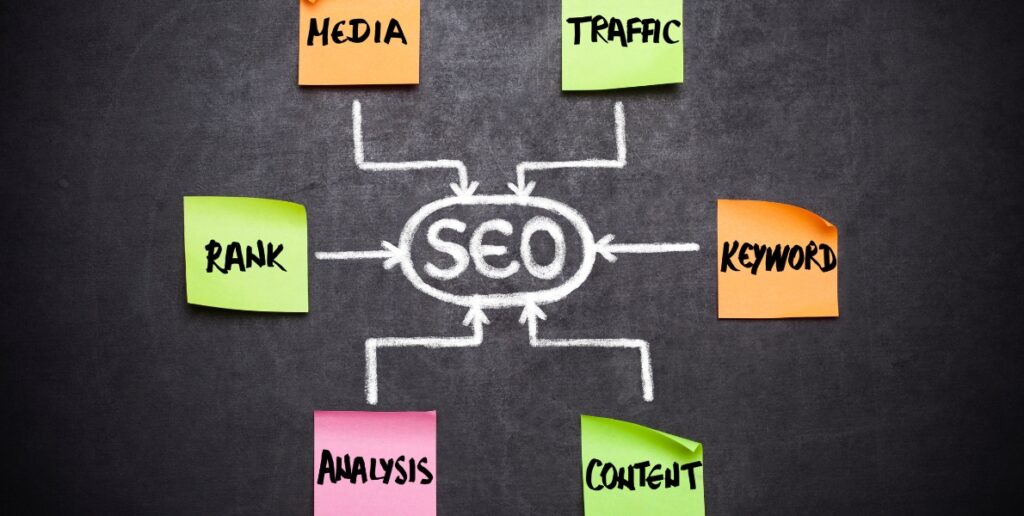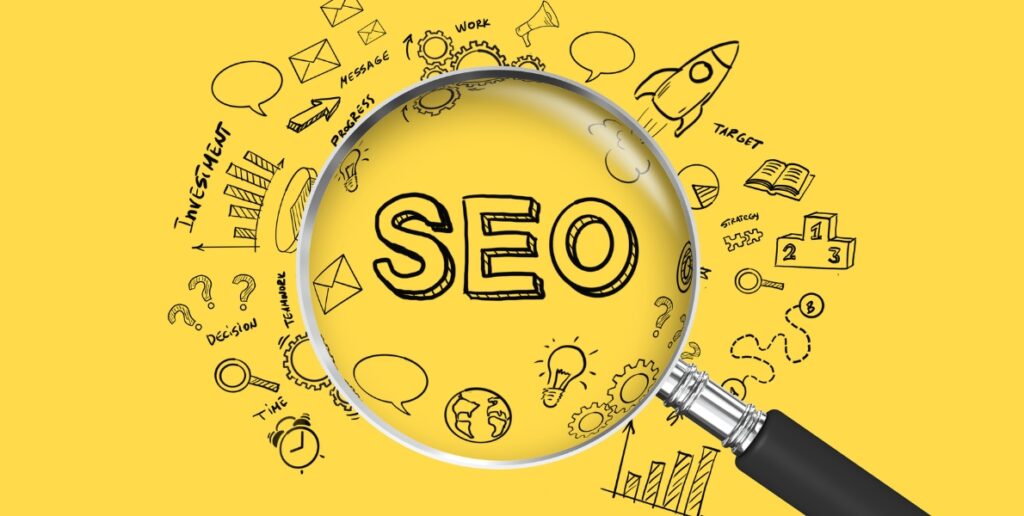Did you hear about the website that was so poorly ranked, it asked for directions to get to the first page? In our 20+ years of designing websites and crafting SEO strategies, we’ve seen firsthand that achieving top online visibility is no laughing matter. It requires a harmonious blend of web design and SEO to ensure your business stands out in the crowded digital landscape.
Web design and SEO are like two peas in a pod; one can’t effectively function without the other. A visually appealing website might catch the eye, but without SEO, potential customers may never find it. Conversely, a website optimized for search engines but lacking in design will fail to engage visitors. Balancing these elements is key to driving traffic and converting visitors into customers.
The Intersection of Design and SEO in the Digital Era

As we navigate the digital era, the fusion of SEO web design, SEO website design, and the creation of SEO-friendly websites has become paramount. This entails not just designing and developing visually appealing sites but also structuring them in a way that search engines love. It’s a delicate dance that ensures both users and search engines can easily navigate and appreciate the content, making your site a beacon in the vast ocean of the internet.
Why Balanced Web Design and SEO is Critical for Business Success
In the competitive world of online business, staying ahead means leveraging every tool at your disposal. That’s where an expert internet marketing agency steps in, bridging the gap between aesthetics and functionality. A balanced approach to web design and SEO not only enhances your digital presence but also fortifies your brand’s credibility, making it easier for customers to find and trust you.
Imagine your website as a storefront. Without the right balance, it’s like having a beautiful store in a hidden alley. Our expertise ensures your site is both inviting and visible, guiding customers straight to your door. This synergy not only boosts your online visibility but also fuels sustainable business growth.
How SEO Affects Web Design Decisions
Every web design decision we make is influenced by SEO, from the structure of the site to the content we craft. This is because potential customers rely on search engines to find what they need. A site designed with both users and search engines in mind ensures a seamless experience that encourages visitors to stay, browse, and ultimately, convert.
Content marketing plays a vital role in this equation. It’s not just about filling your site with words but creating meaningful content that resonates with your audience. By understanding the needs of potential customers, we tailor content that speaks directly to them, enhancing engagement and improving your site’s visibility in search results.
Building the Foundation: Key Elements of SEO Web Design

Incorporating SEO web design principles and practices from the ground up lays a solid foundation for your online success. It’s about more than just looks; it’s ensuring your site is designed to be loved by both users and search engines.
Prioritizing Mobile-Friendliness for a Wider Reach
With the rise of mobile devices, ensuring your website caters to all devices and browsers has never been more important. Responsive SEO web design eliminates duplicate content and adapts to any screen size, improving your chances of ranking well. Thanks to mobile-first indexing, search engines now prioritize mobile-friendly sites, making responsive design a key player in your SEO strategy.
The Impact of Mobile-First Indexing on SEO
Mobile-first indexing means search engines use the mobile version of your site for indexing and ranking. This shift underscores the importance of having a mobile-friendly website. Sites optimized for mobile devices enjoy better visibility and higher rankings, making them more accessible to users on the go. Adapting to this change is crucial for staying competitive in the digital landscape.
Speed Optimization: Enhancing User Experience and SEO
One critical aspect of our marketing strategy is ensuring your website loads quickly. Users expect speed, and search engines reward it. Reducing file sizes and streamlining code is just the start; we focus on creating fast, efficient websites that keep visitors happy and engaged.
Tools and Techniques for Accelerating Page Speed
Various tools and techniques play a role in speeding up your website. From compressing images to leveraging browser caching, we employ a range of strategies to shave off every millisecond. Faster page speeds not only enhance user experience but also contribute significantly to your site’s SEO performance, keeping both users and search engines satisfied.
Crafting an Intuitive Navigation Structure
An intuitive navigation structure is key to a user-friendly website. By strategically using internal links and clear anchor text, we guide visitors through your site, improving their overall experience. This not only makes your site more accessible to users but also makes it easier for search engines to crawl and index your content.
The Role of Sitemaps in SEO and User Experience
Sitemaps are crucial for both SEO and user experience. They provide search engines with a roadmap of your website, ensuring all pages are found and indexed. For users, sitemaps offer an at-a-glance view of your site’s structure, making it easier to find what they’re looking for. This dual benefit makes sitemaps an essential component of SEO-friendly web design.
The Technical Side of SEO Web Design

You don’t need to be a nerd to understand the importance of SEO web design; think of it as the secret sauce that makes your website both delicious and nutritious for search engines. By focusing on SEO-friendly websites and the nuances of designing and developing with SEO in mind, we ensure your site is set up for success from the start.
Structuring URLs for Maximum SEO Benefit
Structured URLs play a significant role in your website’s SEO performance. By crafting clear, concise URLs, we help search engines understand your pages better, making it easier for them to index and rank your content. This clarity also improves user experience, as visitors can easily grasp the content of a page from its URL.
Importance of HTML Tags: Titles, Headings, and Meta Descriptions
HTML tags like titles, headings, and meta descriptions directly influence how both users and engines understand your pages. By adhering to a clear visual hierarchy and keeping meta descriptions under 60 characters, we optimize your on-page optimization, making your content more accessible and appealing to both search engines and visitors.
Crafting Compelling Meta Descriptions for Higher Click-Through Rates
Meta descriptions may be small, but they have a big impact. These brief summaries directly influence whether someone clicks on your page in search results. By crafting compelling meta descriptions, we boost your site’s click-through rates, driving more traffic and improving your overall SEO performance.
Leveraging Alt Tags and File Names for Image SEO
Using alt tags and thoughtful file names in images isn’t just about organization—it’s a powerful SEO strategy. Alt tags help visually impaired users understand an image’s content, enhancing your website’s accessibility. Plus, search engines use this information to better understand and index the images on your site. This dual benefit makes alt tags and careful naming of file names essential for boosting your site’s visibility and ensuring a more inclusive user experience.
Best Practices for Naming Files to Boost SEO
When naming your image files, think of clear, descriptive titles that include relevant keywords. This practice helps search engines understand the content of your images and how they relate to your site’s topics. Avoid generic names like “image1.jpg” and instead, use names that describe the image, such as “homemade-chocolate-chip-cookies.jpg”. This tactic not only improves your site’s SEO but also organizes your image library, making it easier to manage over time.
Content is King: Integrating Content Marketing into Your Strategy

In our two decades of experience, we’ve seen firsthand how content marketing can transform a business’s online presence. By creating valuable, relevant, and consistent content, you can attract and retain a clearly defined audience. This process isn’t just about filling your site with words; it’s about providing real value to your users, thereby increasing your visibility in search engines. Utilizing HTML and CSS to optimize for SEO web design is crucial. This ensures your content is not only informative but also accessible and engaging to your audience.
The Content Marketing Funnel: From Awareness to Conversion
The content marketing funnel represents a journey – guiding potential customers from discovering your brand to making a purchase. At the top, it’s all about creating awareness through engaging content that draws traffic and leads. As these potential customers move down the funnel, your content should educate and solve problems, nurturing these leads into qualified prospects. Finally, at the bottom, your content should aim to convert these prospects into loyal customers. Each stage requires a different approach but contributes to the overall success of your content marketing strategy.
Enhancing Visibility Through Quality Page Content
Quality page content is the cornerstone of any successful SEO strategy. By using tools like Google Search Console, we can gain insights into how our content performs and apply SEO practices to improve visibility. The right content not only attracts the right audience but also keeps them engaged, significantly impacting your site’s ranking in search results.
Keyword Targeting and Its Impact on Content Strategy
Keyword targeting is vital in shaping a content strategy that speaks directly to your audience’s search intent. By understanding the specific terms and phrases your audience uses, you can craft content that answers their questions and meets their needs. This approach not only improves your visibility in search results but also enhances user engagement. Incorporating technical SEO, digital marketing, and regular SEO audits into your strategy ensures that your content remains relevant and competitive in the ever-evolving digital landscape.
Advanced SEO Strategies for Web Design

Incorporating advanced SEO strategies into web design goes beyond basic optimization. It involves a deeper understanding of content marketing and how it integrates with the technical aspects of your site. By focusing on both, you create a synergy that boosts your site’s performance and visibility. Strategic content placement, optimized images, and mobile responsiveness are just the beginning. Deeply embedding content marketing principles into the design process enhances your site’s appeal to both users and search engines.
Technical SEO: A Deep Dive into Backend Optimization
Technical SEO is about fine-tuning the backend of your website to improve its ranking potential. This involves optimizing site structure, enhancing load times, and ensuring your site is easily crawlable by search engine bots. By addressing these technical aspects, we can significantly boost your site’s performance, making it more competitive in search rankings. This deep dive into backend optimization is a critical step in ensuring your website meets the highest standards of SEO.
Rich Snippets and Structured Data: Enhancing SERP Visibility
Rich snippets and structured data are game-changers in enhancing your site’s visibility on search engine results pages (SERPs). By marking up your content with structured data, you help search engines understand and display your content in more engaging ways. This could mean showing star ratings for reviews, prices for products, or even cooking times for recipes directly in the search results. Implementing these features can significantly increase your click-through rates, driving more traffic to your site.
Measuring Success: Tools and Metrics for SEO and Web Design

Measuring the success of your SEO web design efforts is crucial in understanding what works and what needs improvement. By utilizing a range of tools, we can monitor various metrics, such as organic traffic and engagement rates. This data allows us to refine our strategies, ensuring they are as effective as possible. A visually appealing design optimized for search engines is our goal, and the right tools and metrics assist us in creating strategies that achieve this balance.
SEO Audit Tools: Keeping Your Site Health in Check
SEO audit tools are valuable in maintaining the health of your website. They help identify issues that could be hindering your site’s performance, such as broken links, slow loading times, or poorly optimized content. Regular audits ensure your site remains optimized for search engines, helping to sustain and improve its ranking over time. This proactive approach is key to a successful SEO strategy.
Analyzing Organic Traffic: Metrics that Matter
Organic traffic is a critical metric in assessing the effectiveness of your SEO efforts. By analyzing where your traffic is coming from and how users interact with your site, we can gain insights into what’s working and what’s not. This data informs our ongoing strategy, helping to attract more users and improve the overall user experience. Understanding these metrics is essential in driving long-term success and achieving your business objectives.
Common Questions at the Crossroads of SEO and Web Design

At the intersection of SEO and web design, many businesses wonder how to balance aesthetics with optimization. The truth is, both elements are crucial in creating an effective online presence. A well-designed SEO website design not only attracts visitors but also makes it easier for search engines to understand and rank your content. By prioritizing both design and SEO from the start, you can build a website that is both beautiful and functional, maximizing your online potential.
Is Design More Crucial Than SEO in the Early Stages?
In the initial stages of developing a website, there’s often debate about whether design or SEO is more important. From our extensive experience, we believe that both should go hand in hand. A visually appealing design can attract visitors, but without SEO, your site might not be discovered by your target audience. Therefore, integrating SEO principles into the design process from the beginning is essential for building a strong foundation for your online presence.
How Can SEO Web Design Attract High-Intent Traffic?
SEO web design is about more than just looking good; it’s about attracting the right kind of traffic to your site. By focusing on SEO from the design phase, we can target keywords and phrases that attract high-intent traffic. This means visitors are more likely to convert into customers. By optimizing for both engine rankings and user experience, we enhance brand awareness and drive targeted traffic that aligns with your business goals, ultimately contributing to your bottom line.
Looking Ahead: Future Trends in SEO Web Design

As we peer into the future, our over two decades of experience tell us that the synergy between SEO and web design will only deepen. We predict a shift towards more immersive, interactive web experiences that are still fully optimized for search engines. Voice search optimization and AI-driven design and SEO strategies will become the norm, requiring both SEO teams and design agencies to adapt swiftly. Staying ahead means embracing these changes, ensuring that design and SEO continue to work hand in hand, boosting visibility and user experience alike.
The Evolving Landscape of SEO: Predictions and Preparations
The landscape of SEO is ever-changing, and we’re gearing up for even more significant shifts. We foresee a future where seo revolves around a deeper understanding of user intent, propelled by advancements in AI and machine learning. Preparing for this means focusing not just on keywords but on creating content that genuinely answers users’ questions. It’s about making every piece of content and every design element work harder to ensure your site is the go-to source of search engine information.
Embracing Change: How to Stay Ahead in SEO Web Design
To stay at the forefront of web design and SEO, embracing change is not optional—it’s mandatory. Our approach involves a continuous learning mindset, where staying updated with the latest trends and algorithm updates is part of our daily routine. Integrating new technologies into our design process, like AI for personalized user experiences or blockchain for enhanced security, helps us keep our clients’ websites not only relevant but also pioneering in their industries. It’s about being proactive, not reactive, to the waves of change.
Crafting Success: Mastering Web Design and SEO for Your Business

Mastering the art of SEO-friendly web design is a journey we’ve been on for more than two decades. This journey has taught us that success lies in the harmony between design and SEO. From the initial design process to the final SEO touches, every step is an opportunity to enhance your online visibility. Our strategy focuses on building mobile-friendly websites that are not only visually appealing but also optimized for search engines, ensuring they rank high in search engine results. Let us guide you through this process, making your business thrive online.
Real-World Success Stories: Businesses Thriving with SEO-Friendly Web Design
Over the years, we’ve witnessed firsthand the transformative power of SEO-friendly web design. One success story that stands out involves a local bakery that saw a significant increase in online orders after we redesigned their website. By integrating relevant keywords into the body copy and using design elements strategically, we made their site more visible and attractive. This approach not only boosted their search engine rankings but also enhanced user engagement, proving that a well-thought-out SEO and web design strategy can lead to real-world success.
Steps to Take Today for a More Visible Tomorrow
Starting today, you can take steps towards a brighter, more visible future for your business online. Begin by auditing your current website, focusing on mobile responsiveness and loading speed. Implementing SEO basics, like optimizing your content with relevant keywords and ensuring your site is indexed correctly by search engines, is crucial. Consider partnering with an internet marketing agency that understands the delicate balance between design and SEO. Together, we can craft a strategy that propels your business to the top of search engine results, ensuring lasting success.
Navigating the Path to Online Dominance: A Comprehensive Conclusion
In our journey of over 20 years in creating websites and mastering SEO, we’ve seen firsthand the transformative power of a well-designed website that adheres to accessibility guidelines. Achieving online dominance is no small feat, but with a balanced integration of SEO web design and content strategy, businesses can scale new heights in digital visibility. It’s about crafting an online presence that not only ranks well but also provides an exceptional user experience.
As we look ahead, staying updated with the latest in SEO web design, SEO becomes crucial. Adhering to accessibility guidelines ensures that our websites are inclusive, reaching a wider audience and upholding ethical standards in digital spaces. By continuing to innovate and adapt, we pave the way for our businesses to not just compete but lead in the online world. The path to online dominance is a continuous journey, and we’re here to guide you every step of the way.




We hope you gained value from learning how SEO can directly affect your Web Design!